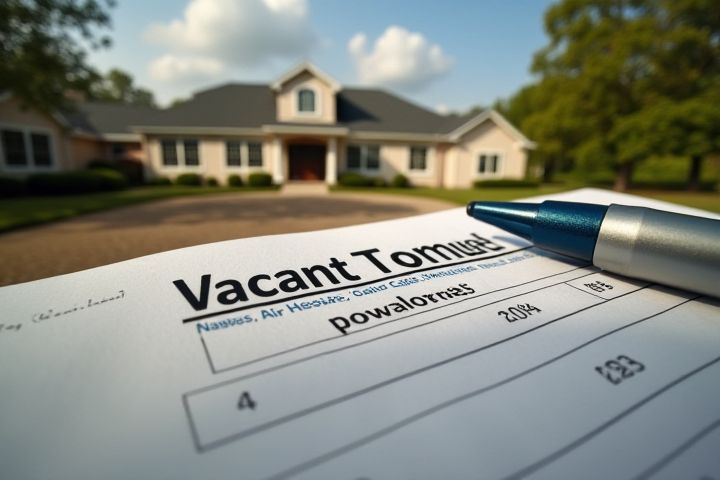
Insuring a vacant house is possible, but it typically requires specialized coverage known as vacant home insurance or unoccupied property insurance. Standard homeowners insurance often does not cover homes that are uninhabited for extended periods, which may leave you vulnerable to risks like theft, vandalism, or structural damage. When applying for this type of insurance, you should disclose the duration the house will remain vacant and any security measures you have taken, such as maintaining utilities or installing alarms. Premiums for vacant home policies can be higher than standard policies due to the increased risk associated with unoccupied properties. Always compare different insurance providers to find coverage that best suits your needs and protects your investment effectively.
Can You Insure A Vacant House
Coverage limitations
When insuring a vacant house, you may encounter specific coverage limitations that are crucial to understand. Standard homeowner policies often exclude protection for unoccupied properties, especially after 30 days of vacancy, meaning you could face significant financial risk in case of theft, vandalism, or certain types of damage. Some insurers provide specialized vacant home insurance, but these plans frequently come with reduced coverage for risks such as fire or water damage. It's essential to review policy terms carefully, as many providers will restrict or exclude liability coverage for vacant homes, impacting your financial safety net.
Increased premiums
Insuring a vacant house often leads to increased premiums due to the higher risk associated with unoccupied properties. Insurers typically assess factors such as potential vandalism, theft, and maintenance issues, all contributing to an elevated risk profile. Premiums can rise by as much as 25% to 50% compared to standard homeowner's insurance rates. To protect your investment, it's critical to shop around and compare policies tailored specifically for vacant properties.
Vacancy insurance policies
Vacancy insurance policies specifically address the risks associated with insuring an unoccupied home, which can include theft, vandalism, and damage from natural disasters. Many standard homeowners' insurance policies do not cover vacant properties, typically defining vacancy as a home unoccupied for more than 30 days. By obtaining a vacancy insurance policy, you can protect your investment, often covering liability and property damage up to $500,000 or more, depending on the provider. Consider looking into options that cater to your specific needs, as many insurers offer tailored coverage for vacant homes.
Property inspections
Insuring a vacant house often requires thorough property inspections to assess its condition and risks. Insurers typically mandate these inspections to identify potential hazards, such as plumbing issues, roof integrity, and pest infestations, which could increase liability. You may need to schedule inspections at regular intervals--usually every 30, 60, or 90 days--to maintain your policy, as insurers want to ensure the property remains secure. Additionally, some insurance providers offer specialized vacant home insurance policies that account for these unique risks, helping to protect your investment efficiently.
Security requirements
Insuring a vacant house often hinges on specific security requirements designed to mitigate risks associated with unoccupied properties. Many insurance providers mandate the installation of functional security systems, including smoke detectors, burglar alarms, and deadbolt locks, to qualify for coverage. You may also need to demonstrate that the property is regularly monitored, possibly through a security service or periodic inspections every 30 days. Fulfilling these criteria can not only enhance your chances of obtaining insurance but also help lower premium costs by reducing potential hazards.
Maintenance obligations
Insuring a vacant house requires understanding specific maintenance obligations to avoid policy gaps. Insurance providers typically mandate regular upkeep, including lawn care and plumbing checks, to ensure the property remains in good condition. Failure to meet these maintenance standards can lead to policy cancellation or denial of claims if damage occurs. You should also document all maintenance activities, as this may help in justifying your coverage during inspections or claims.
Short-term coverage options
Short-term coverage options for insuring a vacant house typically include specialized policies designed to protect properties that are unoccupied for a limited period, often ranging from one month to one year. Insurance providers may offer basic fire and liability coverage, along with additional features like vandalism protection or theft coverage for properties at risk during vacancy. Premiums may vary significantly depending on factors such as location, property size, and duration of vacancy, making it essential to compare quotes from different insurers. You can often find tailored solutions designed specifically for homeowners seeking temporary protection during transitions or renovations.
Renovation or repair coverage
Insuring a vacant house can be challenging, especially when focusing on renovation or repair coverage. Many insurance providers offer specialized policies designed for homes undergoing renovations, which typically cover damages that may occur while the property is vacant. For example, policies may include coverage for liability claims, theft, or damage from weather-related incidents, while also addressing risks associated with ongoing repairs. When seeking coverage, you should inquire about specific terms and conditions, as some insurers may have waiting periods or exclusion clauses related to vacant properties.
Policy cancellation risks
Insuring a vacant house comes with specific policy cancellation risks that homeowners must navigate. Vacant property insurance often has stricter conditions compared to standard homeowners' insurance, leading to potential policy cancellations if these conditions are not met. Failure to secure adequate security measures, such as boarding up windows and regularly inspecting the property, can trigger these cancellations. Understanding your insurer's rules and maintaining consistent communication can help mitigate risks associated with coverage for your vacant dwelling.
Specialized insurers
Specialized insurers often provide tailored coverage options specifically for vacant houses, addressing unique risks like vandalism, theft, and maintenance issues. Many policies allow you to choose between actual cash value and replacement cost coverage, ensuring that your financial interests are protected based on your needs. Some insurers may impose a waiting period, typically ranging from 30 to 60 days after the home becomes vacant, before coverage becomes effective. It's essential to compare quotes and coverage options from various specialized insurers to find the best policy for your vacant property.
